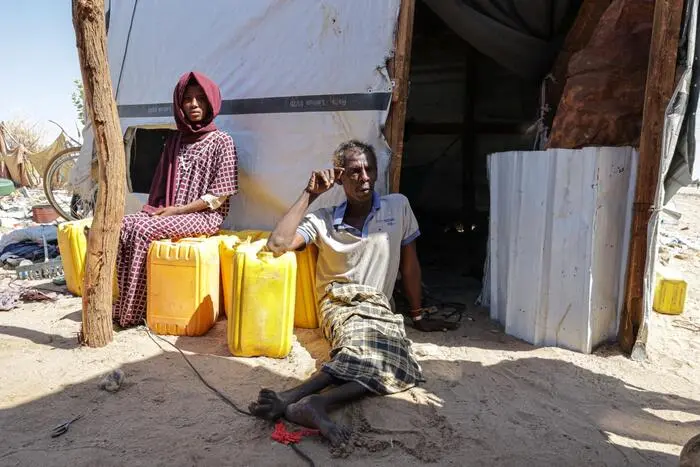Ma’rib: A Haven for Thousands Fleeing Yemen’s Violence

Yemen Monitor/Reporting Unit:
The International Organization for Migration (IOM) reported on Wednesday that Ma’rib Governorate has become a sanctuary for thousands displaced by the violence and uncertainty since the start of the conflict in Yemen.
Among these is Salim, a husband and father who fled his home in Hodeidah with his wife and children two years ago to escape the escalating conflict. Life had been stable for Salim’s family. Each day, he would ride his motorbike to earn enough to provide for his family’s basic needs.
Salim’s determination helped his family maintain a sense of normalcy, but this resilience was tested when the conflict reached their doorstep. A rocket strike near their modest home forced them to abandon everything they had worked for.
According to the IOM, now in the arid Al-Khushif area inhabited by the displaced in Ma’rib, Salim and his family hope to rebuild their lives. Like countless other displaced people, they were forced to leave everything behind, and their dream of building a stable home has not materialized. Salim never imagined that he would have to build a shelter from sticks and worn-out fabrics.
A New Struggle
The organization says that hardships worsened when Salim suffered a medical setback that changed everything. After a routine injection, he began to lose control of his legs, and within a year, he was paralyzed. Doctors recommended treatment abroad, but the costs were far beyond what Salim could afford.
“When my children fall ill, I’m afraid to have them injected. I don’t want them to end up like me,” Salim said.
With Salim unable to work, the family’s roles changed dramatically. His wife, Hasna, took on the role of the primary breadwinner and supported the family during this difficult period. She joined the IOM’s protection team as a volunteer, providing much-needed stability for her family during this challenging time.
In the midst of the chaos, Hasna tried to balance her work with caring for her husband. While visiting her family in Hodeidah, Hasna would call frequently to check on Salim and the children. Then one day, Salim received the devastating news of Hasna’s unexpected death.
Invisible Strength
As one of 4.5 million people with disabilities in Yemen, Salim faces ongoing challenges in accessing essential services such as healthcare, water points, and toilets – most of which are shared and often inaccessible. The sandy terrain surrounding the displacement site further complicates his movement.
At only 14 years old, Salim’s son had to take on responsibilities far beyond his years. To help support the family, he began working on a nearby farm during the onion harvest season, sometimes renting a motorbike for a day’s work, and worked long hours under the scorching sun clinging to any hope he could bring to his family.
Meanwhile, Shafiqa, Salim’s teenage daughter, had to assume the role of her mother. Her days, once dedicated to learning and playing, are now filled with caring for her younger siblings. She manages the household as best she can, preparing meals with whatever little they have. She also cares for her father, helping him move around and remaining attentive to his needs.
“I feel happy to take care of my father, but I also have a deep fear of losing him, just as we lost our mother,” Shafiqa, Salim’s daughter, said.
Dignity for All
The IOM has dedicated itself to meeting the basic needs of people with disabilities, recognizing the unique challenges they face. Through its protection team, the IOM provides cash assistance to help cover critical basic expenses such as food, healthcare, and transportation, ensuring that these families can manage their daily lives with dignity. The IOM also distributes dignity kits containing essential hygiene items to meet practical needs while promoting respect and inclusion within the community.
For Salim and his children, the IOM’s support has been a step towards stability. By providing transitional shelter, the IOM provided them with a safe space with privacy and protection from strong winds and stray animals, restoring a sense of peace amidst uncertainty.
Additionally, the IOM’s camp coordination and management workshop in Ma’rib produced essential equipment to make daily life more comfortable and convenient for people with disabilities. In 2024 alone, over 130 people received items such as beds, accessible toilet sets, and custom-designed wheelchairs, promoting independence and giving them a renewed sense of freedom.





